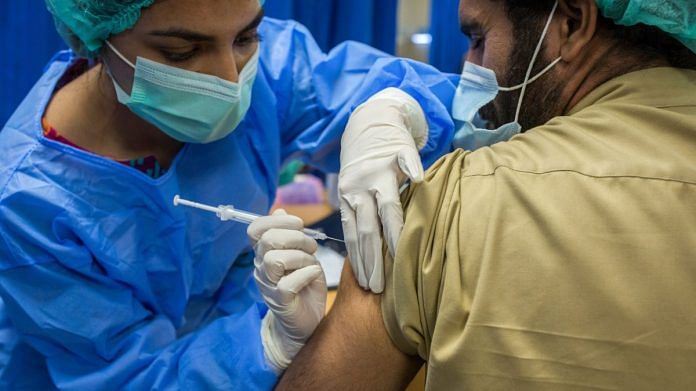New Delhi: Vaccinations are necessary to boost immune responses even in young people who have been previously infected, according to a study published in Lancet journal, which shows a past Covid-19 infection does not completely protect against reinfection in young people.
Data collected from over 3,000 healthy members of the US Marines Corps — most of them aged 18-20 years — showed reinfection occurs despite previous infection and the presence of antibodies, the study said, emphasising that vaccination is still necessary to boost immune responses, prevent reinfection, reduce transmission.
The researchers of the study published in The Lancet Respiratory Medicine suggested that young people should take up the vaccine wherever possible.
During the study, conducted between May and November 2020, it was found that around 10 per cent (19 out of 189) of the participants who were previously infected with SARS-CoV-2 became reinfected, compared with new infections in 50 per cent (1,079 out of 2,247) of participants who had not previously been infected.
Although the participants were all young, fit, and mostly male Marine recruits, the authors of the report believe the risk of reinfection found in their study will apply to many young people.
However, the researchers acknowledge that the US marines are at a higher risk of infection owing to the crowded living conditions on a military base and close personal contact required for basic training, which could contribute to a higher overall infection rate than seen elsewhere.
“As vaccine roll outs continue to gain momentum it is important to remember that, despite a prior Covid-19 infection, young people can catch the virus again and may still transmit it to others. Immunity is not guaranteed by past infection, and vaccinations that provide additional protection are still needed for those who have had COVID-19,” senior author of the study Stuart Sealfon from Icahn School of Medicine at Mount Sinai in the US, said in a statement.
Also read: Can AI tell us how severe patient’s Covid infection will be? Study finds promising results
How the study was conducted
In the study, US Marine Corps recruits completed an unsupervised quarantine at home for two weeks before entering a Marine-supervised quarantine facility for another two weeks.
They received antibody tests to establish whether any of the recruits were seropositive — that is they had previously been infected with SARS-CoV-2 and had antibodies.
They were also tested for new SARS-CoV-2 infection at the beginning of the study and then weeks one and two of the quarantine. They then completed a questionnaire including demographic information, risk factors, medical history, and Covid-19 symptoms.
Recruits who tested positive for a new second Covid-19 infection during the study were isolated and the study team followed up with additional testing. Levels of neutralising antibodies were also taken from subsequently infected seropositive and selected seropositive participants who were not reinfected during the study period.
Of the 2,346 Marines followed long enough for this analysis of reinfection rate, 189 were seropositive and 2,247 were seronegative at the start of the study.
As many as 1,098 participants got infected during the study. Among the seropositive participants, 19 (10 per cent) tested positive for a second infection during the study.
‘Immunity resulting from natural infection not guaranteed’
To understand why these reinfections occurred, the authors studied the reinfected and not infected participants’ antibody responses. They found that, among the seropositive group, participants who became reinfected had lower antibody levels against SARS-CoV-2 than those who did not become reinfected.
In addition, neutralising antibodies were less common in the seropositive group.
The study also found that the viral load in reinfected seropositive recruits was on average only 10 times lower than in infected seronegative participants, which could mean that some reinfected individuals could still have a capacity to transmit infection, but the authors note that this will need further investigation.
“Our study shows that some individuals with lower levels of neutralizing antibodies were reinfected, indicating that it is possible that previously infected and recovered people are susceptible to new SARS-CoV-2 infection at a later time,” Lt. Dawn Weir, of the US Navy Medical Research Centre, said in a statement.
The takeaway message for all young people, he adds is that immunity resulting from natural infection is not guaranteed.
(Edited by Sanghamitra Mazumdar)
Also read: ‘Unpredictable’ Covid strain in Ahmedabad causing lung damage & delayed symptoms, say doctors



